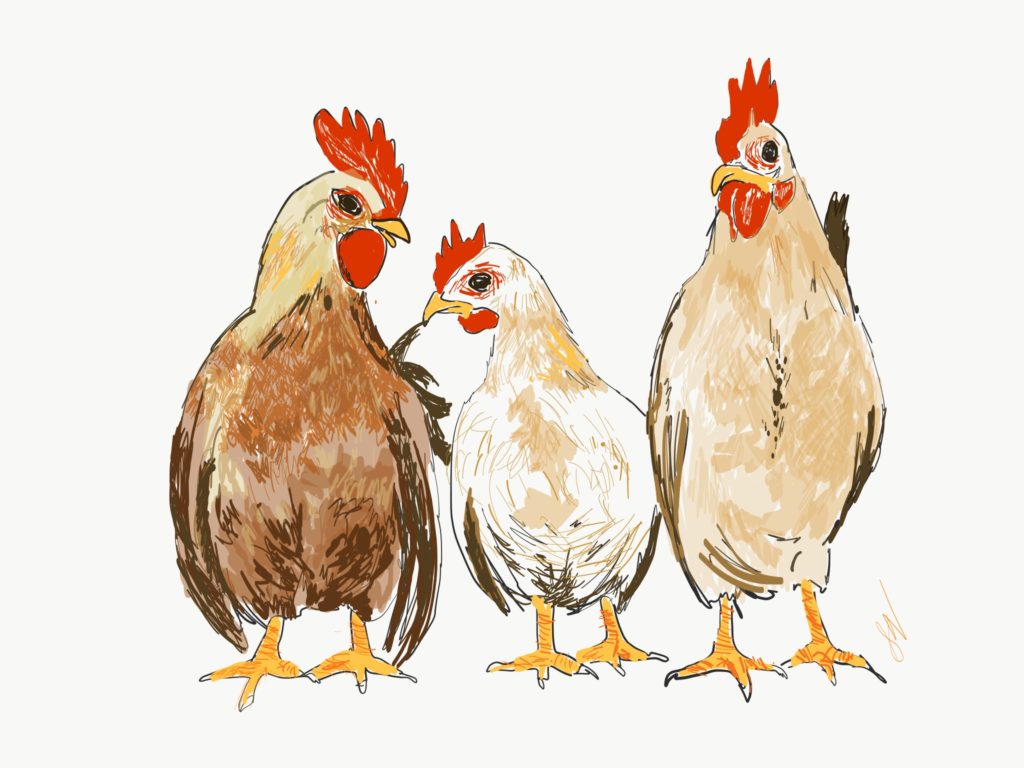On a rice plantation, on the outskirts of the village of Lobo in the Philippines, the air hung heavy and damp.
Teresa took a deep breath, expanding her lungs with the scent of overripe bananas.
She slapped at mosquitoes, annoyed that her legs were polka dotted with itchy bites and mosquito blood.
Teresa sheltered herself in the space beneath her aunt’s small bamboo hut. It had a square floor plan supported by sturdy wooden stilts that raised the nipa hut above the ground by 6 feet.
Her Aunt’s hut had a single entry and exit point. A ladder leaned up against the door, falling away like a stiff tongue from a rectangular shaped mouth.
Teresa giggled softly as she drifted in the flow of her imagination.
The bamboo hut overhead sprang to life; its stilts turned into human legs, complete with knobby knees. One by one, the transformation spread to all the other huts throughout the village.
The people left inside the belly of the huts were snap frozen, suspended in time. This way, all the huts were free to take expeditions up the mountains, or take dips in the river or frolic by the seaside.
Then come midday, like faithful dogs, the huts would know to return home, just before their owners came back from working the fields.
And those carried away inside the wandering huts would be instantly unfrozen, completely unaware of their hut’s wild adventures.
Teresa wanted nothing better than to be left alone under the hut, but the chickens scratched and pecked away at the dirt beside her feet.
“Go away or I’ll do what I did to one of your sisters,” she said, flinging her arms out wide.

The flightless creatures scattered a while before regrouping, reverently bowing to her with each pecking motion.
But what Teresa worshipped was sitting on her lap. It was her most treasured possession.
She turned the tattered pages of her book with fingers sore from denuding a chicken of its glory. The chickens always looked so different without their feathers, skinnier, and very ugly without their heads.
Not too far away, in a house not built on stilts, her mother worked in the kitchen.
She heard the rhythmic thud of her mother’s cleaver descend on the chicken Teresa had plucked earlier.
After expertly dismembering it, the flesh would be boiled in a pot filled with freshly picked chokos, carrots, celery, onion and garlic.
Teresa had half an hour before she’d have to fetch her father and her brothers from the rice fields for lunch.
Sometimes, Teresa would savour holding her book against her chest as if it were a baby.
It was hers, and hers alone. Her brothers knew nothing of its existence. She was confident that the chickens would keep her secret.
Dog-eared and crimped from the humidity, she never tired of rereading the words or admiring the drawings on its pages.
The book was the prize for coming first in the second grade spelling bee. She’d won that competition almost a full year ago.
Resilience.
“R-E-S-I-L-I-E-N-C-E.” She spelled out to the chickens, rehashing her victory over Michael Santos—the smartest student in her class. He’d thrown in an additional ‘L’ and that cost him the final round.
Resilience. She liked the feel of the word in her mouth, especially the hissing of ‘s’ sounds.
She didn’t know the full definition of the word, having only memorized the two hundred words on the list. One of these days, she’d get around to learning its meaning.
Back to her book, Teresa turned to her favourite page with its simple illustration. With her finger, she traced the outline of a young man in beautiful robes.
He stood amongst five lions that were lying relaxed, completely undisturbed by his presence.
The lions should have torn him to shreds and fought over his body with their razor sharp teeth.
A vision of what lunchtime would be like today flooded her mind. Her brothers ripping meat off the chicken with their teeth like half-starved lions.
Then her eyes landed back on the crinkled illustration.
God did not allow young Daniel to be eaten.
Teresa ached to know the great and powerful God who could do such a wondrous thing.
From above she heard a deep voice.
“Teresa, I can see that you’re busy doing nothing,” her Aunty Nene said, setting off a coughing fit. The wet rattle of her lungs (by a dreadful case of influenza) bore down through the gaps between the bamboo slats above her.
Teresa angled her head upwards at the neat lines of the bamboo slats.
Her aunt’s dark eyes, like black marbles, spied on her through a slim crack.
Teresa slid the thin book into the large pocket of her pinafore. “I’m coming, Tita Nene.”

Slipping on her tsinelas—her trusted rubber slippers, she raced to the water pump. A bucket half filled with water was waiting by the pump. Flexing her biceps, she tipped all the water from the bucket down the pump to prime it, then worked the lever up and down.
She refilled the bucket and set it aside. Under the cooling rush of water, she rubbed one foot over the other, scrubbing all evidence of dirt and chicken poop away.
Teresa still remembered her Aunt swatting her for entering the hut with unwashed feet, and that was well over two years ago.
The mosquito bites on Teresa’s legs turned numb by the water flow.
She let go of the pump and slid her feet back into her slippers. Her heels jutted out from them by a half an inch. The trusty tsinelas made sucking sounds as she ran back to her Aunt’s hut.
She left her tsinelas by the base of the ladder and climbed her way up.
Teresa leaned in through the doorway. Aunty Nene was lying flat on her banig—a woven mat—on the floor, a limp pillow was cushioning her head.
Then the old lady surrendered to a violent fit of wet coughs and flopped about like a fish out of water.
An empty glass positioned next to the ailing woman’s head toppled over.
Her Aunty pointed to a glass jug on the table. Teresa refilled the glass in a hurry.
With her foot, Teresa moved a plastic bag filled with used tissues aside. She noticed dark red stains on some of the tissues. Blood.
With care, she planted herself on her knees in the cleared space.
She suspected that this illness was more than just a severe case of influenza. It had been going on for far too long.
“There, Aunty. Your water.”
Teresa helped the old woman up to a semi sitting position, pressing the glass up to her Aunt’s lips.
Her Aunt collapsed back into the pillow. Teresa drew the thin sheet over her Aunt’s frail body. “I’ll be back to bring you a meal,” Teresa said.
The old woman nodded gently and shut her eyes.
Teresa’s mother was right. Life’s like a rock—it’s hard.
Join me for Part 2 of Waiting to be Found.



Very Nice
Thanks
I love this so much, I really liked Teresa’s imagination. I can’t wait for part 2!
Hoping to post again this friday. Thanks for your support, Em.
Well Shirl, you’re becoming a seasoned writer now. This article attests to that. Looking forward to part 2.
Thanks, Tita Perla. Pray for me.
Waiting for part 2. Very good writing.
Village captured nicely (Tony).
Thanks for your support.
Shirley shouldn’t it be – lost, searching, found.
The story has tension but we wait for part 2.
I borrowed the title from a song called ‘Waiting to be found’, by Susan Ashton. I liked it so much that I thought it fit perfectly with the story.
I know I’m late to the party, but it made me smile when I got to then end and saw the saying that Miss M has bestowed upon me and many other of her kids! Love you always Miss M ❤️
Thanks Mrs N for another amazing post. Made my day to read it ????
Thanks Mel. Miss M was pretty special.